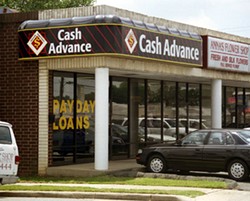Stop PaymentAlternatives to payday loans
Is it the end of the line for shady lenders?
By Karen ShugartA death knell may be sounding for payday lenders in North Carolina. More than a month after one of the state's largest purveyors of the short-term, high-interest loans was ordered to stop lending, other payday companies also are suspending new cash advances. Several of the businesses that dotted Charlotte strip malls now sit vacant.
It's too soon to predict the complete shutdown of payday loan shops statewide. But if the shops did shut down, consumers could save as much as $93 million, estimates Susan Lupton, senior policy associate with the Center for Responsible Lending, which warns people to stay away from the businesses. That adds up to about $800 each year for the typical payday borrower. Still, the disappearance of payday loans also would mean such borrowers -- often people with strained credit and little access to traditional methods -- likely would need new methods to keep their bills paid.
Payday loans work like this: Borrowers take a pay stub and proof of checking account to a business such as Advance America, Check 'n' Go or Check Into Cash. The borrowers write postdated checks and in as little as 15 minutes they can come out with up to $500. It's supposed to be paid off within a specific time frame, often two weeks. Lenders say the practice gives a hand to people with the least access to quick cash.
But if borrowers can't pay back the money when time expires, the loan is renewed and the interest fee is levied again -- sometimes marking the beginning of an unmanageable cycle. "They almost become indentured slaves to these things, because they get bigger and bigger and they just don't go away," says Bruce Hamlett, director of United Family Services' Economic Independence Program.
The loans' interest rates make MasterCard look charitable: A $100 two-week loan, with a $15 fee, has an annual interest rate of 391 percent. The rate can top 1,000 percent on some loans -- even though state consumer-finance law caps annual percentage rates on small loans at 36 percent.
Since 2001, payday lenders have skirted North Carolina regulations by making loans through out-of-state banks -- a so-called "rent-a-charter" or "rent-a-bank" model. Within the past year, however, they've been dealt some daunting setbacks. The Federal Deposit Insurance Corporation, which regulates payday lenders, announced lenders had to let a borrower pay in installments after a payday loan hit the 90-day mark.
Then, in December, North Carolina Commissioner of Banks Joseph A. Smith ruled that the payday lending practices of America Cash Advance Centers of NC were illegal. And Attorney General Roy Cooper said lenders using the rent-a-charter model were operating illegally. "We expect them to follow the law and we will continue to fight payday lending at every turn," Cooper said in a statement.
Some payday lenders maintained the ruling didn't apply to them. Still, lenders such as Check 'n' Go and Check Into Cash have ceased making new loans for now (they remain open to take payment on existing loans). And some out-of-state banks that partnered with lenders are pulling the plug on operations in North Carolina. Neither company returned calls seeking comment. But consumer advocates are thrilled. "We feel like this industry does not add value," says Lupton says. Payday borrowers are some of the poorest clients seen by Susan Robiscek, a Charlotte bankruptcy attorney who only sees people at their financial breaking point. "If the loans were successful, they'd never come to me," she says.
"The people that I see that would typically get a payday loan are people who don't have money for groceries or to make the light bill or a car payment," Robiscek adds.
All indications aside, payday loans may not be history. The industry contributes substantially to elected officials, including embattled House Speaker Jim Black. The General Assembly from 1997 to 2001 formally allowed lenders to operate in North Carolina (lenders adopted the rent-a-charter model when state law expired). Payday supporters tried in the last legislative session to get another bill passed that would allow them to operate.
Will payday loan companies seek legal authority to operate again in North Carolina? "Certainly," Lupton predicts. "And we think the General Assembly should just turn their backs on them."
It takes a little creativity to find an alternative to payday loans, but here are some suggestions from the
Center for Responsible Lending:
• Salary advances from employers
• Credit card advances
• Making arrangements with creditors
• Loans from friends, relatives, religious groups or social service agencies
Latest in News Feature
More by Karen Shugart
-
Mecklenburg and beyond ...
Feb 10, 2009 -
Mecklenburg and beyond ...
Feb 9, 2009 -
Mecklenburg and beyond ...
Feb 6, 2009 - More »
Calendar
-

Wine & Paint @ Blackfinn Ameripub- Ballantyne
-

Queen Charlotte Fair @ Route 29 Pavilion
-

NEW WINDOW GALLERY-Pat Rhea-ACRYLIC PAINTINGS-April 05-30 2024 VALDESE, NC 28690 @ New Window Gallery/Play It Again Records
- Through April 30, 12 p.m.
-

TheDiscountCodes
-

Face to Face Foundation Gala @ The Revelry North End
-
Five Common Reasons Why Small Businesses Fail
-
Homer's night on the town 41
If you drank a shot with the Knights mascot on Sept. 20, you were basically harboring a fugitive
-
6 Factors to Consider When Buying Kratom Online 5










